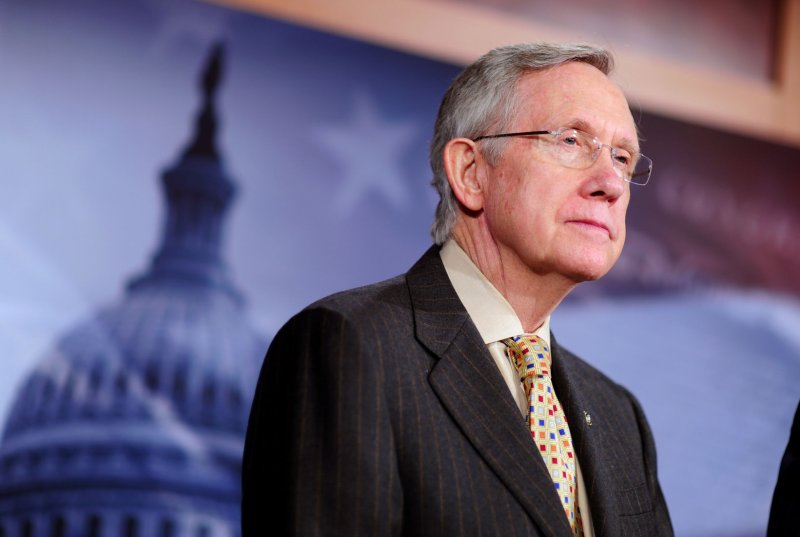Senate Majority Leader Harry Reid (D-NV) is seen at a press conference where he announced that he has canceled the July 4 Senate recess in order to keep the Senate in session to continue work on the budget and the debt ceiling negotiations in Washington on June 30, 2011. UPI/Kevin Dietsch |
License Photo
WASHINGTON, July 13 (UPI) -- Debt-limit talks ended Wednesday with conflicting accounts from participants on whether U.S. President Barack Obama abruptly walked out of the negotiations.
House Majority Leader Eric Cantor, R-Va., told reporters after the session the president became "very agitated" after Cantor asked whether he would reconsider allowing congressional Republicans to split the vote to raise the $14.3 trillion federal borrowing limit into two separate votes, The Washington Post reported.
"Well, that's when he got very agitated, seemingly, and said that he had sat here long enough and that no other president -- Ronald Reagan wouldn't sit here like this, and he's reached the point where something's got to give," Cantor said.
He said Obama told him, 'Eric, don't call my bluff,' and that he was "going to the American people on this,'"and then pushed away from the table, said "I'll see you tomorrow," and left the room.
Democrats who attended the meeting said Obama was trying to conclude the session but Cantor interrupted him to get in a final word, The Hill reported. Asked whether Cantor's account was accurate, House Minority Leader Nancy Pelosi, D-Calif., said: "No. Absolutely not."
The White House did not immediately respond to requests for comment, The Hill said.
Tea Party leader Sen. Jim DeMint, R-S.C., Wednesday rejected Senate Minority Leader Mitch McConnell's idea to give the president authority to raise the debt ceiling.
"Republicans weren't elected last November to make it easier to spend and borrow and add to our debt," DeMint told CBS News.
But, he added, "This idea that Republicans will not vote to increase the debt limit is wrong," and the GOP will support a deal with serious spending cuts.
McConnell, R-Ky., went on conservative talk radio Wednesday to defend his proposal.
"Just like we knew shutting down the government in 1995 was not going to work for us -- it helped Bill Clinton get re-elected -- I refuse to help Barack Obama get re-elected by marching Republicans into a position where we have co-ownership of a bad economy," Politico reported he said on the Laura Ingraham show.
McConnell said he refused to accept either of two choices from Obama.
"One is that the Republican Party becomes tax collector for the welfare state, and no Republican Party I've had the privilege to serve is ever going to take that deal. I'm certainly not," he said. "Or we sort have a bipartisan agreement to accept a smoke-and-mirrors deal and call it good. Not on my watch."
Senate Majority Leader Harry Reid, D-Nev., has proposed a congressional panel to impose spending cuts to back up the plan offered by McConnell, officials of both parties told the Post.
Congress and the president are heading toward an Aug. 2 deadline for raising the debt ceiling, now at $14.3 trillion, or the country starts defaulting on its obligations.
The details of Reid's plan were still being worked out, but the new joint House-Senate committee would have Democratic and Republican lawmakers, and their enforceable budget-cutting plan could be fast-tracked to a vote in each chamber, the officials told the Post.
At the White House, press secretary Jay Carney said McConnell's proposal "is effectively an acknowledgment of what we had said all along, that there is no alternative to the United States honoring its obligations."
He said the Office of Management and Budget would examine the idea, although it is "a fallback backup option, not the preferred option."
The credit rating agency Moody's Investors Service said Wednesday it has put the U.S. government's Aaa bond rating on review for a possible downgrade.
In a statement posted on its Web site, Moody's said it took the step "given the rising possibility that the statutory debt limit will not be raised on a timely basis, leading to a default on US Treasury debt obligations."
Moody's had said July 2 a rating review would be likely in mid-July "unless there was meaningful progress in negotiations to raise the debt limit."
Moody's said the review of the U.S. government bond rating resulted from "the possibility that the debt limit will not be raised in time to prevent a missed payment of interest or principal on outstanding bonds and notes. As such, there is a small but rising risk of a short-lived default."
"Moody's considers the probability of a default on interest payments to be low but no longer to be de minimis," the statement said.
The addition to McConnell's "last-choice option" -- which the officials characterized as ameliorating -- was leaked after McConnell was excoriated by conservatives and Tea Party members.
McConnell's proposal would place the entire burden for raising the $14.3 trillion debt limit on Obama.
It would give Obama authority to raise the limit by $2.5 trillion in three installments -- $700 billion by Aug. 2, $900 billion in the fall and another $900 billion next summer, officials said.
The increases could take effect without congressional approval, but Congress could block them within 15 days by a two-thirds vote of both houses.
If the debt ceiling is not raised by Aug. 2, Treasury officials have said the government could default on its payments because it would only be able to spend the money it brings in each day.
The Social Security Administration is scheduled to pay $23 billion in benefits Aug. 3, but the Internal Revenue Service is expected to bring in $12 billion in tax revenue that day, the Bipartisan Policy Center calculated.
The center was founded by former Senate Majority Leaders Howard Baker, R-Tenn., Tom Daschle, D-S.D., Bob Dole, R-Kan., and George Mitchell, D-Maine.















